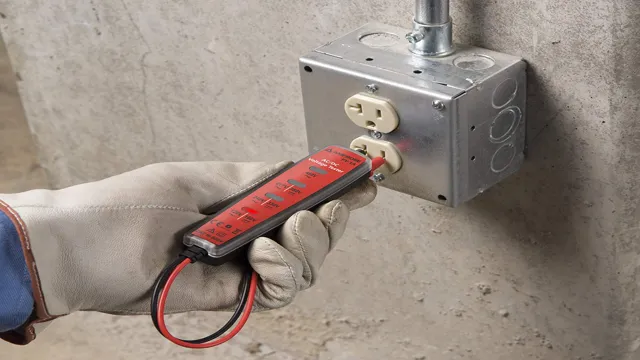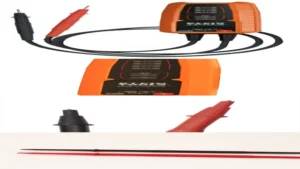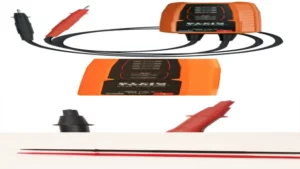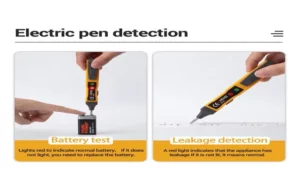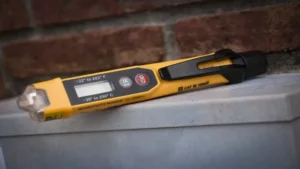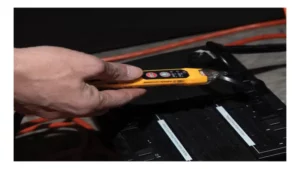Voltage testers are an essential tool for anyone who works with electrical equipment or wiring. They are used to test whether an electrical circuit is live or not, and can help to prevent accidents and injuries by identifying potential electrical hazards before they become a problem. But with so many different types and models of voltage testers available on the market, it can be challenging to know which one is right for your needs.
That’s where this comprehensive guide comes in. Whether you’re a professional electrician or a DIY enthusiast, this guide will help you choose the best voltage tester for your specific needs. We’ll cover the different types of testers available, including non-contact and contact voltage testers, and explain the pros and cons of each.
We’ll also discuss essential features to look for, such as safety ratings and accuracy, and offer tips for using your voltage tester safely and effectively. So if you’re in the market for a new voltage tester, or just want to learn more about these crucial electrical tools, keep reading. We’ll help you navigate the confusing world of voltage testers and find the one that’s right for you.
Understanding Voltage Testers
When it comes to electrical work, having the best voltage tester is essential for safety and accuracy. A voltage tester is a tool used to determine whether an electrical circuit is live or not. There are several different types of testers available, including non-contact testers, digital multimeters, and analog multimeters.
Each type has its own benefits and drawbacks, and the best choice depends on the specific task and personal preference. Non-contact testers use electromagnetic fields to detect voltage and are easy to use, but may not be as accurate as other options. Digital and analog multimeters provide more precise readings, but may be more difficult to operate.
Ultimately, finding the best voltage tester comes down to considering the task at hand, personal comfort level, and budget. It is important to always use caution when working with electrical systems and to select a high-quality tester to ensure safety and accuracy.
What is a voltage tester?
A voltage tester is an essential tool for anyone working around electrical systems. It allows you to determine whether an electrical circuit is live or not, by measuring the presence and strength of the electrical field. Essentially, it helps you avoid potentially fatal electric shocks when working with these circuits.
Understanding how to use a voltage tester is crucial for any electrician, but it’s also a useful skill for homeowners looking to do their own electrical work. Different types of voltage testers exist, including contact testers, non-contact testers, and multimeters. Contact testers require you to physically touch the circuit with the metal tip of the tester, while non-contact testers can detect the electrical field without touching the circuit.
Multimeters can measure voltage, current, and resistance, making it a versatile tool in any electrical work setting. In summary, a voltage tester is a vital tool for anyone working with electrical systems as it allows you to determine whether an electrical circuit is alive, avoid potentially fatal electric shocks, and troubleshoot electrical systems efficiently.
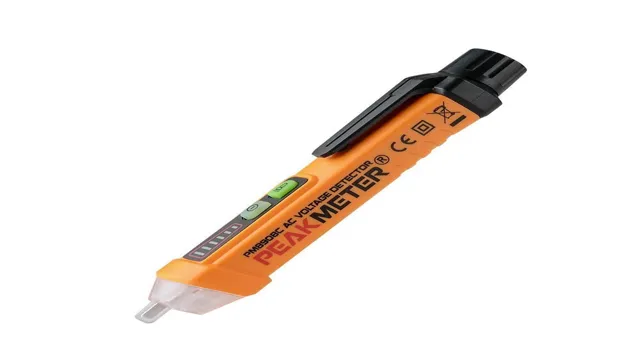
Types of voltage testers
Voltage testers are tools used to check the presence and level of electrical voltage in a circuit or device. They come in different types and forms, including non-contact voltage testers, voltage testers with probes, multimeters, and power outlet testers. Each type differs in various aspects, such as the level of accuracy, ease of use, and the type of voltage they can detect.
Non-contact voltage testers are easy to use and can detect the presence of voltage without having to touch the device, making them suitable for beginners. On the other hand, voltage testers with probes provide more accuracy by measuring the voltage level directly, making them ideal for professional electricians. Multimeters can measure various electrical values, including voltage, current, and resistance, making them more versatile but also more complicated to use.
Lastly, power outlet testers are designed to check if a power outlet is connected correctly and can detect issues such as reversed polarity or open ground, making them ideal for homeowners. Choosing the right voltage tester depends on the intended purpose and the level of accuracy required.
Why do you need a voltage tester?
As a DIY enthusiast or professional electrician, a voltage tester is one of the essential tools in your toolkit. It’s an important safety device that helps you detect the presence of electricity in a particular wire or outlet before you begin working on it. A voltage tester uses a non-contact method to measure the voltage level of an electrical circuit without making direct contact with it.
This non-invasive technique eliminates the risk of electric shock and protects you from voltage spikes that could damage the circuit or your equipment. With a voltage tester, you can identify faulty wiring, verify the presence of electricity in a circuit, and troubleshoot electrical problems with confidence. It’s a versatile tool that can be used in residential, commercial, and industrial electrical applications.
Invest in a high-quality voltage tester, and you’ll have a reliable and indispensable tool for all your electrical projects.
Factors to Consider When Choosing a Voltage Tester
When it comes to choosing the best voltage tester, there are a few factors you should consider to ensure you get the right tool for the job. First and foremost, think about the type of work you will be doing and the maximum voltage you may encounter. Some testers are designed for lower voltage applications, while others can handle much higher levels.
Additionally, consider the display type of the tester, as well as its accuracy and durability. Ultimately, the best voltage tester for you will depend on your specific needs and preferences, so take your time when researching and choosing. Don’t forget to read reviews and ask for recommendations from other professionals in your field to help guide your decision.
Accuracy
When it comes to choosing a voltage tester, accuracy should be one of your top priorities. This is because an inaccurate voltage tester can not only give you false readings but can also be dangerous. To ensure accuracy, there are several factors you should consider.
First, the accuracy class of the voltage tester should match the level of precision you require. For example, if you need to measure voltage with high precision, you should choose a tester with a higher accuracy class. Second, the voltage range of the tester should match the range of the voltage you will be testing.
Third, consider the testing environment and whether the tester is suited for the conditions in which you will be using it. Finally, always ensure that the voltage tester you choose is certified by a reputable organization to ensure that it meets industry standards for accuracy and safety. By taking these factors into account, you can ensure that you choose a voltage tester that will give you accurate readings and keep you safe while using it.
Safety features
When it comes to choosing a voltage tester, there are several factors that you should consider to ensure your safety. First and foremost, look for a tester that comes with safety features such as automatic shut-off and overload protection. These features will prevent electrical shocks and potential damage to the tester itself.
Another important factor is the voltage range of the tester. Be sure to select a model that can handle the voltage range you will be working with. Additionally, choose a tester with clear and easy-to-read display indicators.
This will help ensure that you can accurately read the voltage level. Lastly, consider the type of tester you need. For example, a non-contact tester may be safer and easier for those who are new to electrical work, while a contact tester may be more precise for advanced users.
By taking these factors into consideration, you can choose a voltage tester that meets your needs and keeps you safe.
Ease of use
When choosing a voltage tester, there are various factors to consider, including its ease of use. You want a tester that is simple to use and does not cause confusion or frustration when interpreting results. Look for a tester that has clear and visible readings, with easy to understand indications of the voltage level.
Additionally, ensure that the tester is comfortable to hold and use, with an ergonomic design and lightweight construction. A tester with a simple interface and intuitive controls will make your work more comfortable and less time-consuming, increasing your efficiency and productivity. Consider a voltage tester with additional features such as an automatic shut-off to save battery life and a built-in flashlight for low-light situations.
A voltage tester that is easy to use will significantly reduce your stress level, making your job more enjoyable and efficient.
Durability
When looking for a voltage tester, it’s important to consider its durability. Your voltage tester should be able to withstand wear and tear from everyday use and last for a long time. Start by looking for a tester with a sturdy case that can protect it from accidental drops or bumps.
The quality of the materials used in the tester’s construction is also crucial, as cheap materials are more likely to break down over time. Make sure that the tester is designed to withstand the conditions you will be using it in, whether that’s a busy construction site or a DIY project in your home. Remember, investing in a durable tester now will save you money in the long run by avoiding the need for frequent replacements.
Top Voltage Testers on the Market
When it comes to finding the best voltage tester, there are a lot of options on the market. Some of the top choices include the Fluke T5-600, Klein Tools NCVT-3, and Sperry Instruments STK00 The Fluke T5-600 is perfect for electricians as it can measure both current and voltage.
It also has an automatic shut-off feature to help conserve battery life. The Klein Tools NCVT-3 is a handy tool that can detect the presence of voltage without coming into contact with the wire. This tester is perfect for those who want to ensure safety on the job.
Finally, the Sperry Instruments STK001 is a reliable choice that is both budget-friendly and easy to use. It comes with a voltage tester, GFCI receptacle tester, and a dual-range non-contact voltage tester. Overall, when searching for the best voltage tester it’s important to consider the specific needs and budget to make the right choice for you.
Fluke T5-1000 Electrical Tester
When it comes to voltage testers, the Fluke T5-1000 Electrical Tester is definitely a top contender in the market. This tool is perfect for electricians and DIY enthusiasts who need to test voltage and current quickly and accurately. It features an easy-to-use design, with a large display screen that shows AC/DC voltage and current readings, as well as continuity and resistance measurements.
The tool also has a built-in voltage detector that can sense voltage without contacting the wire. Its durable design ensures that it can withstand rough use and harsh conditions. Overall, the Fluke T5-1000 is an excellent investment for those in need of a reliable and effective voltage tester.
Fluke 1AC-A1-II VoltAlert Non-Contact Voltage Tester
Voltage Testers When it comes to working with electricity, safety is paramount, and having the right tools can make all the difference. If you’re in the market for a voltage tester, there are many options to choose from. One of the best on the market is the Fluke 1AC-A1-II VoltAlert Non-Contact Voltage Tester.
This tester is incredibly easy to use. You simply touch the tip to a conductor, and the tester will light up and beep if there is a voltage present. It’s perfect for testing outlets, switches, and wires, and it can even detect voltage in cables behind walls.
Plus, it’s compact and durable, making it a great tool for on-the-go use. Of course, there are many other great voltage testers out there to choose from as well, so be sure to do your research and find the one that’s right for you and your specific needs.
Klein Tools NCVT-2 Dual Range Non-Contact Voltage Tester
If you’re looking for a voltage tester, there are a lot of great options on the market. One of the best is the Klein Tools NCVT-2 Dual Range Non-Contact Voltage Tester. This tester is easy to use and provides reliable voltage readings.
It has a dual range of 12-1000VAC and 1000-2000VAC, so you can use it for a wide range of applications. Plus, it’s designed with safety in mind, with a bright LED light that alerts you to the presence of voltage. Another great feature of this tester is its compact size, making it easy to carry with you wherever you go.
Whether you’re a professional electrician or a DIY enthusiast, the Klein Tools NCVT-2 is a great choice for all your voltage testing needs.
Sperry Instruments VD6505 Adjustable Non-Contact Voltage Detector
When it comes to electrical work, safety should always be a top priority. One way to ensure your safety is by using a reliable voltage tester. However, with so many options out there, it can be hard to choose the right one.
That’s why we’re here to help! The Sperry Instruments VD6505 Adjustable Non-Contact Voltage Detector is one top voltage tester to consider. This tester features an adjustable sensitivity to detect voltage in outlets, wires, cords, and fixtures. It also has a bright LED bar to indicate the voltage strength and an audible beep to alert you of the presence of electricity.
Plus, it has a compact and handheld design for easy use. While the Sperry Instruments VD6505 is a great option, it’s worth doing your research to find a voltage tester that meets your specific needs and preferences. Always remember to prioritize safety when working with electricity.
Conclusion: Choosing the Best Voltage Tester
When it comes to voltage testers, there is no one-size-fits-all solution. It all depends on your specific needs and preferences. However, if you want a tool that is reliable, accurate, and easy to use, you can’t go wrong with a digital multimeter.
After all, why settle for just a voltage tester when you can have a multipurpose tool that can measure voltage, current, resistance, continuity, and more? So, if you’re looking for the best voltage tester, take a voltage meter and elevate it to the next level with a digital multimeter.”
FAQs
1. What features should I look for in a voltage tester? A: Look for a tester with a clear display, accurate readings, and safety features such as overload protection. 2. Can I use a voltage tester to test both AC and DC circuits? A: This depends on the specific voltage tester you have. Some testers are designed for both AC and DC circuits, while others are designed for only one type. 3. What is the difference between a non-contact voltage tester and a contact voltage tester? A: A non-contact voltage tester detects electrical fields without making physical contact with the circuit, while a contact voltage tester requires physical contact with the circuit. 4. How do I use a voltage tester safely? A: Always follow the manufacturer’s instructions, wear appropriate safety gear, and make sure the circuit is de-energized before testing. 5. Can a voltage tester detect the presence of voltage in a wire that is not connected to the circuit? A: No, a voltage tester can only detect the presence of voltage in a live circuit. 6. What is the average lifespan of a voltage tester? A: This varies depending on the quality of the tester and how frequently it is used. However, a well-maintained voltage tester can last several years. 7. How do I know if my voltage tester is accurate? A: Make sure it is calibrated regularly and compare its readings to those of a calibrated voltage reference.
